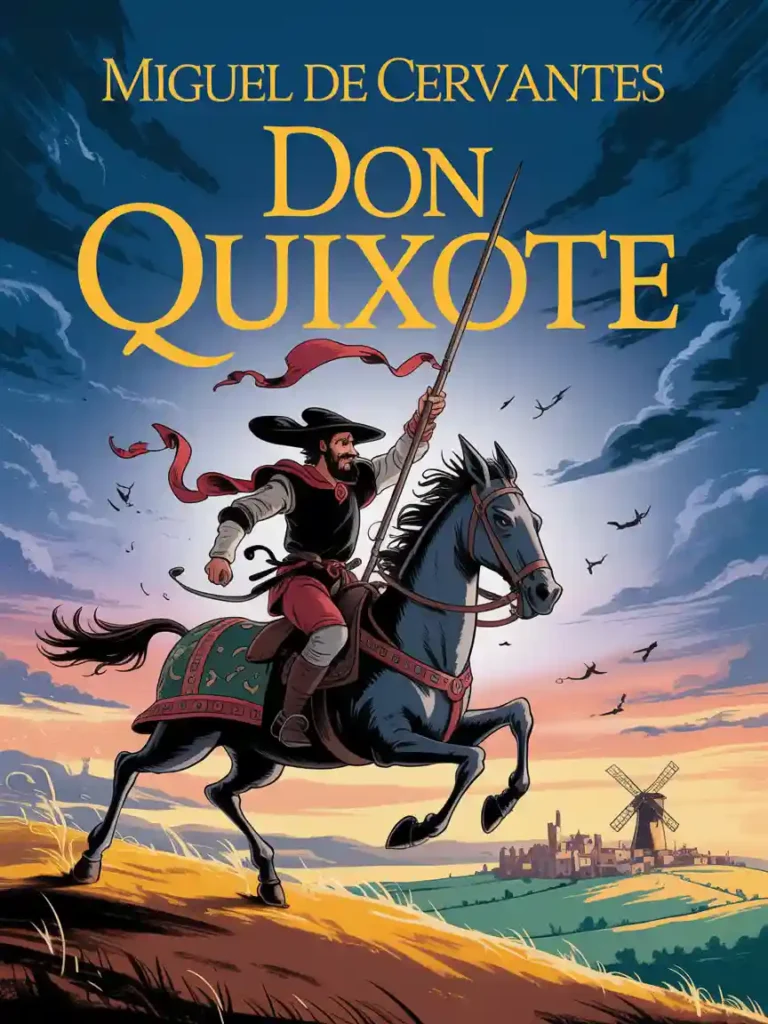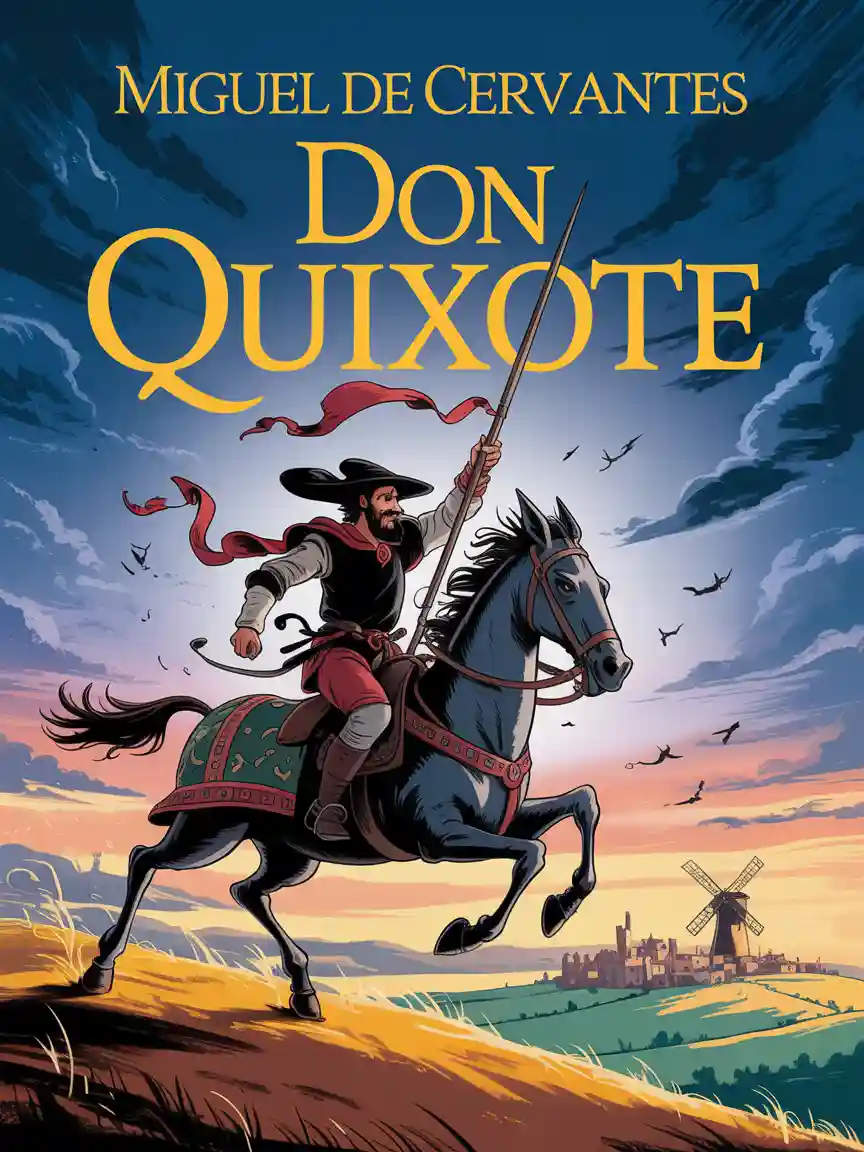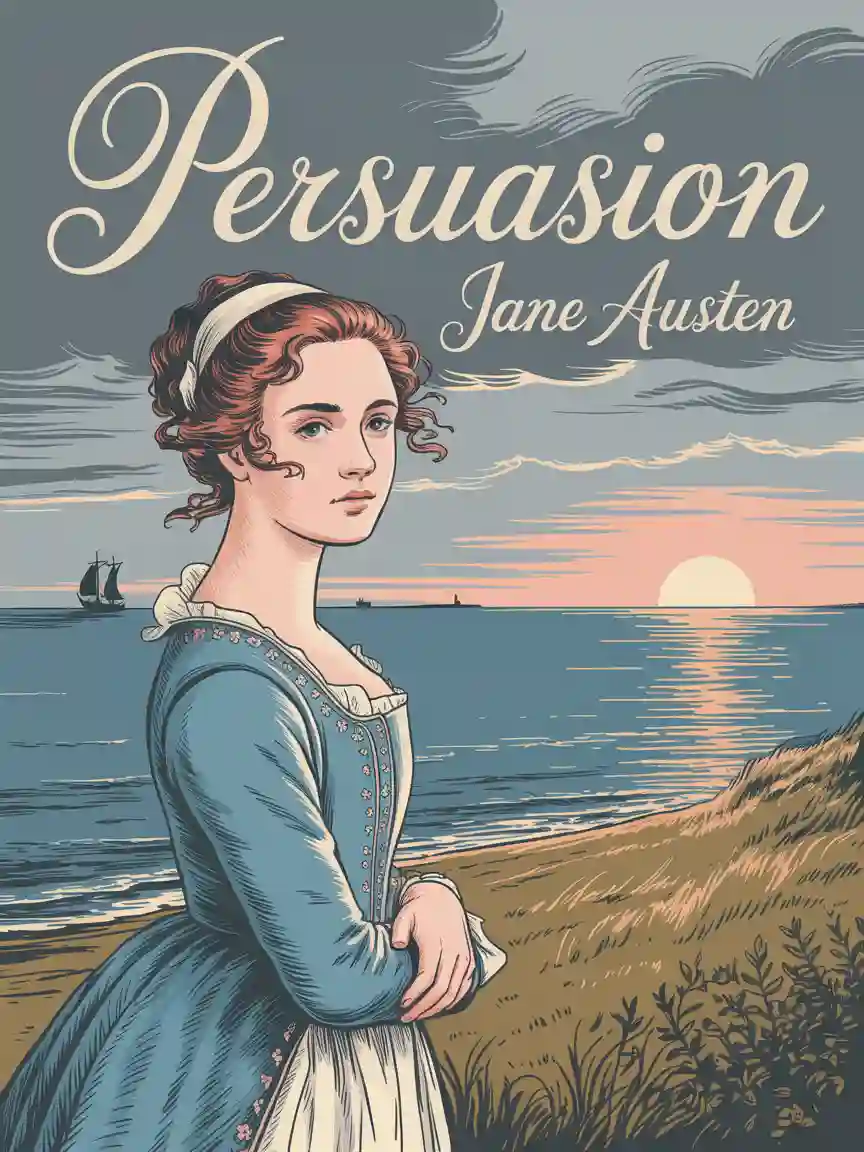CHAPTER 5
OF THE SHREWD AND DROLL CONVERSATION THAT PASSED BETWEEN SANCHO PANZA
AND HIS WIFE TERESA PANZA, AND OTHER MATTERS WORTHY OF BEING DULY
RECORDED
The translator of this history, when he comes to write this fifth chapter,
says that he considers it apocryphal, because in it Sancho Panza speaks in a
style unlike that which might have been expected from his limited intelli-
gence, and says things so subtle that he does not think it possible he could
have conceived them; however, desirous of doing what his task imposed
upon him, he was unwilling to leave it untranslated, and therefore he went
on to say:
Sancho came home in such glee and spirits that his wife noticed his hap-
piness a bowshot off, so much so that it made her ask him, “What have you
got, Sancho friend, that you are so glad?”
To which he replied, “Wife, if it were God’s will, I should be very glad
not to be so well pleased as I show myself.”
“I don’t understand you, husband,” said she, “and I don’t know what you
mean by saying you would be glad, if it were God’s will, not to be well
pleased; for, fool as I am, I don’t know how one can find pleasure in not
having it.”
“Hark ye, Teresa,” replied Sancho, “I am glad because I have made up
my mind to go back to the service of my master Don Quixote, who means
to go out a third time to seek for adventures; and I am going with him again,
for my necessities will have it so, and also the hope that cheers me with the
thought that I may find another hundred crowns like those we have spent;
though it makes me sad to have to leave thee and the children; and if God
would be pleased to let me have my daily bread, dry-shod and at home,
without taking me out into the byways and cross-roads—and he could do it
at small cost by merely willing it—it is clear my happiness would be more
solid and lasting, for the happiness I have is mingled with sorrow at leaving
thee; so that I was right in saying I would be glad, if it were God’s will, not
to be well pleased.”
“Look here, Sancho,” said Teresa; “ever since you joined on to a knight-
errant you talk in such a roundabout way that there is no understanding
you.”
“It is enough that God understands me, wife,” replied Sancho; “for he is
the understander of all things; that will do; but mind, sister, you must look
to Dapple carefully for the next three days, so that he may be fit to take
arms; double his feed, and see to the pack-saddle and other harness, for it is
not to a wedding we are bound, but to go round the world, and play at give
and take with giants and dragons and monsters, and hear hissings and roar-
ings and bellowings and howlings; and even all this would be lavender, if
we had not to reckon with Yanguesans and enchanted Moors.”
“I know well enough, husband,” said Teresa, “that squires-errant don’t eat
their bread for nothing, and so I will be always praying to our Lord to deliv-
er you speedily from all that hard fortune.”
“I can tell you, wife,” said Sancho, “if I did not expect to see myself gov-
ernor of an island before long, I would drop down dead on the spot.”
“Nay, then, husband,” said Teresa; “let the hen live, though it be with her
pip, live, and let the devil take all the governments in the world; you came
out of your mother’s womb without a government, you have lived until now
without a government, and when it is God’s will you will go, or be carried,
to your grave without a government. How many there are in the world who
live without a government, and continue to live all the same, and are reck-
oned in the number of the people. The best sauce in the world is hunger, and
as the poor are never without that, they always eat with a relish. But mind,
Sancho, if by good luck you should find yourself with some government,
don’t forget me and your children. Remember that Sanchico is now full fif-
teen, and it is right he should go to school, if his uncle the abbot has a mind
to have him trained for the Church. Consider, too, that your daughter Mari-
Sancha will not die of grief if we marry her; for I have my suspicions that
she is as eager to get a husband as you to get a government; and, after all, a
daughter looks better ill married than well whored.”
“By my faith,” replied Sancho, “if God brings me to get any sort of a
government, I intend, wife, to make such a high match for Mari-Sancha that
there will be no approaching her without calling her ‘my lady.”
“Nay, Sancho,” returned Teresa; “marry her to her equal, that is the safest
plan; for if you put her out of wooden clogs into high-heeled shoes, out of
her grey flannel petticoat into hoops and silk gowns, out of the plain ‘Mari-
ca’ and ‘thou,’ into ‘Dona So-and-so’ and ‘my lady,’ the girl won’t know
where she is, and at every turn she will fall into a thousand blunders that
will show the thread of her coarse homespun stuff.”
“Tut, you fool,” said Sancho; “it will be only to practise it for two or
three years; and then dignity and decorum will fit her as easily as a glove;
and if not, what matter? Let her he ‘my lady,’ and never mind what
happens.”
“Keep to your own station, Sancho,” replied Teresa; “don’t try to raise
yourself higher, and bear in mind the proverb that says, ‘wipe the nose of
your neigbbour’s son, and take him into your house.’ A fine thing it would
be, indeed, to marry our Maria to some great count or grand gentleman,
who, when the humour took him, would abuse her and call her clown-bred
and clodhopper’s daughter and spinning wench. I have not been bringing up
my daughter for that all this time, I can tell you, husband. Do you bring
home money, Sancho, and leave marrying her to my care; there is Lope To-
cho, Juan Tocho’s son, a stout, sturdy young fellow that we know, and I can
see he does not look sour at the girl; and with him, one of our own sort, she
will be well married, and we shall have her always under our eyes, and be
all one family, parents and children, grandchildren and sons-in-law, and the
peace and blessing of God will dwell among us; so don’t you go marrying
her in those courts and grand palaces where they won’t know what to make
of her, or she what to make of herself.”
“Why, you idiot and wife for Barabbas,” said Sancho, “what do you mean
by trying, without why or wherefore, to keep me from marrying my daugh-
ter to one who will give me grandchildren that will be called ‘your
lordship’? Look ye, Teresa, I have always heard my elders say that he who
does not know how to take advantage of luck when it comes to him, has no
right to complain if it gives him the go-by; and now that it is knocking at
our door, it will not do to shut it out; let us go with the favouring breeze that
blows upon us.”
It is this sort of talk, and what Sancho says lower down, that made the
translator of the history say he considered this chapter apocryphal.
“Don’t you see, you animal,” continued Sancho, “that it will be well for
me to drop into some profitable government that will lift us out of the mire,
and marry Mari-Sancha to whom I like; and you yourself will find yourself
called ‘Dona Teresa Panza,’ and sitting in church on a fine carpet and cush-
ions and draperies, in spite and in defiance of all the born ladies of the
town? No, stay as you are, growing neither greater nor less, like a tapestry
figure—Let us say no more about it, for Sanchica shall be a countess, say
what you will.”
“Are you sure of all you say, husband?” replied Teresa. “Well, for all that,
I am afraid this rank of countess for my daughter will be her ruin. You do as
you like, make a duchess or a princess of her, but I can tell you it will not be
with my will and consent. I was always a lover of equality, brother, and I
can’t bear to see people give themselves airs without any right. They called
me Teresa at my baptism, a plain, simple name, without any additions or
tags or fringes of Dons or Donas; Cascajo was my father’s name, and as I
am your wife, I am called Teresa Panza, though by right I ought to be called
Teresa Cascajo; but ‘kings go where laws like,’ and I am content with this
name without having the ‘Don’ put on top of it to make it so heavy that I
cannot carry it; and I don’t want to make people talk about me when they
see me go dressed like a countess or governor’s wife; for they will say at
once, ‘See what airs the slut gives herself! Only yesterday she was always
spinning flax, and used to go to mass with the tail of her petticoat over her
head instead of a mantle, and there she goes to-day in a hooped gown with
her broaches and airs, as if we didn’t know her!’ If God keeps me in my sev-
en senses, or five, or whatever number I have, I am not going to bring my-
self to such a pass; go you, brother, and be a government or an island man,
and swagger as much as you like; for by the soul of my mother, neither my
daughter nor I are going to stir a step from our village; a respectable woman
should have a broken leg and keep at home; and to be busy at something is
a virtuous damsel’s holiday; be off to your adventures along with your Don
Quixote, and leave us to our misadventures, for God will mend them for us
according as we deserve it. I don’t know, I’m sure, who fixed the ‘Don’ to
him, what neither his father nor grandfather ever had.”
“I declare thou hast a devil of some sort in thy body!” said Sancho. “God
help thee, what a lot of things thou hast strung together, one after the other,
without head or tail! What have Cascajo, and the broaches and the proverbs
and the airs, to do with what I say? Look here, fool and dolt (for so I may
call you, when you don’t understand my words, and run away from good
fortune), if I had said that my daughter was to throw herself down from a
tower, or go roaming the world, as the Infanta Dona Urraca wanted to do,
you would be right in not giving way to my will; but if in an instant, in less
than the twinkling of an eye, I put the ‘Don’ and ‘my lady’ on her back, and
take her out of the stubble, and place her under a canopy, on a dais, and on a
couch, with more velvet cushions than all the Almohades of Morocco ever
had in their family, why won’t you consent and fall in with my wishes?”
“Do you know why, husband?” replied Teresa; “because of the proverb
that says ‘who covers thee, discovers thee.’ At the poor man people only
throw a hasty glance; on the rich man they fix their eyes; and if the said rich
man was once on a time poor, it is then there is the sneering and the tattle
and spite of backbiters; and in the streets here they swarm as thick as bees.”
“Look here, Teresa,” said Sancho, “and listen to what I am now going to
say to you; maybe you never heard it in all your life; and I do not give my
own notions, for what I am about to say are the opinions of his reverence
the preacher, who preached in this town last Lent, and who said, if I remem-
ber rightly, that all things present that our eyes behold, bring themselves be-
fore us, and remain and fix themselves on our memory much better and
more forcibly than things past.”
These observations which Sancho makes here are the other ones on ac-
count of which the translator says he regards this chapter as apocryphal,
inasmuch as they are beyond Sancho’s capacity.
“Whence it arises,” he continued, “that when we see any person well
dressed and making a figure with rich garments and retinue of servants, it
seems to lead and impel us perforce to respect him, though memory may at
the same moment recall to us some lowly condition in which we have seen
him, but which, whether it may have been poverty or low birth, being now a
thing of the past, has no existence; while the only thing that has any exis-
tence is what we see before us; and if this person whom fortune has raised
from his original lowly state (these were the very words the padre used) to
his present height of prosperity, be well bred, generous, courteous to all,
without seeking to vie with those whose nobility is of ancient date, depend
upon it, Teresa, no one will remember what he was, and everyone will re-
spect what he is, except indeed the envious, from whom no fair fortune is
safe.”
“I do not understand you, husband,” replied Teresa; “do as you like, and
don’t break my head with any more speechifying and rethoric; and if you
have revolved to do what you say-”
“Resolved, you should say, woman,” said Sancho, “not revolved.”
“Don’t set yourself to wrangle with me, husband,” said Teresa; “I speak
as God pleases, and don’t deal in out-of-the-way phrases; and I say if you
are bent upon having a government, take your son Sancho with you, and
teach him from this time on how to hold a government; for sons ought to
inherit and learn the trades of their fathers.”
“As soon as I have the government,” said Sancho, “I will send for him by
post, and I will send thee money, of which I shall have no lack, for there is
never any want of people to lend it to governors when they have not got it;
and do thou dress him so as to hide what he is and make him look what he
is to be.”
“You send the money,” said Teresa, “and I’ll dress him up for you as fine
as you please.”
“Then we are agreed that our daughter is to be a countess,” said Sancho.
“The day that I see her a countess,” replied Teresa, “it will be the same to
me as if I was burying her; but once more I say do as you please, for we
women are born to this burden of being obedient to our husbands, though
they be dogs;” and with this she began to weep in earnest, as if she already
saw Sanchica dead and buried.
Sancho consoled her by saying that though he must make her a countess,
he would put it off as long as possible. Here their conversation came to an
end, and Sancho went back to see Don Quixote, and make arrangements for
their departure.





